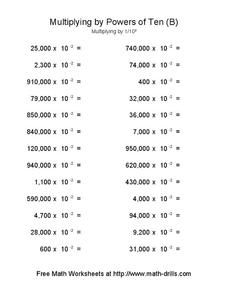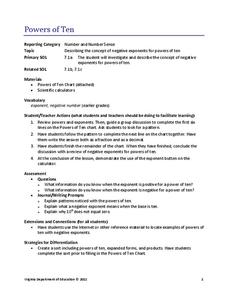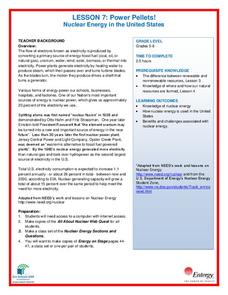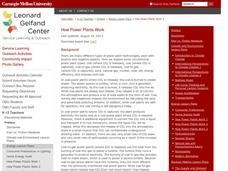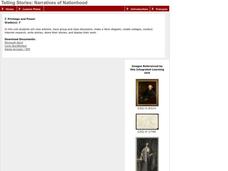Curated OER
Multiplying by Powers of Ten (B)
Fifth graders multiply two to five-digit numbers by powers of ten with an exponent of one. This four-page worksheet contains 40 problems, with answers.
Curated OER
Multiplying by Powers of Ten (E)
Young mathematicians multiply two to five-digit numbers by powers of ten with an exponent to one. This four-page worksheet contains approximately 40 problems, with answers.
Curated OER
Multiplying by Powers of Ten (B)
Fifth graders multiply five to six-digit numbers by powers of ten containing negative two exponents. This four-page worksheet contains approximately 40 problems, with exponents.
Overcoming Obstacles
Developing Personal Power
The final lesson in the series teaches participants that they can use their personal power to bring about positive change. The class engages in a series of activities that reveal the kinds of personal power they have, including the power...
Overcoming Obstacles
Developing Personal Power
Money? Beauty? Education? The final lesson in the Confidence Building module encourages middle schoolers to consider the power they have to determine the course of their lives. After investigating different forms of power, participants...
Ahisma Summer Institute
The Power of One - Math in a Different Angle
In this 2-day lesson focused on exponents, middle schoolers will cross the curriculum by engaging in science, history and language arts activities. Exponential growth will be explored using grains of rice on a chess board. Exponential...
C-SPAN
Choice Board: Expressed and Implied Powers
Article 1, Section 8 of the United States Constitution expressly lists powers given to Congress. Over the years, lawmakers have expanded the enumerated powers to include powers implied by the list. To better understand the significance...
Virginia Department of Education
Powers of Ten
Investigate negative exponents of-ten. Pupils use the pattern of increasing powers of 10 to determine negative powers of 10. The scholars write the powers in expanded and product forms and make the connection to exponents using a...
Teach Engineering
Maximum Power Point
Investigate the maximum power output of a photovoltaic panel with a instructional activity that introduces the class to the maximum power point. Individuals learn how to determine the maximum power point of a solar panel by using Ohm's...
EngageNY
Numbers in Exponential Form Raised to a Power
Develop an understanding of the properties of exponents through this series of activities. This third lesson of 15 explores the patterns associated with the power property. Scholars expand the powers before applying the property.
American Bar Association
What Is Separation of Powers?
Who has the power? Scholars investigate the creation of the three branches of government in the United States Constitution. They analyze just why the framers created the branches the way they did.
Teach Engineering
Fluid Power Basics
What can bulldozers and screen doors have in common? Use this lesson on fluid power to find out. It begins with some simple teacher demonstrations, includes a couple of videos, and culminates with an inquiry-based activity to investigate...
National Wildlife Federation
Power Pellets! Nuclear Energy in the United States
Nuclear power provides about 20 percent of the energy generated in the United States. The seventh activity in the series of 12 tackles nuclear power. After sharing what they know about nuclear energy, scholars complete a WebQuest make a...
Practical Action
The Wind Power Challenge
Up it goes! Groups must design and build a windmill able to lift a weight. The packet includes discussion points to use prior to the build that cover topics such as variables, fairness, and the design process.
Virginia Department of Education
Work and Power
Assist your class with correctly calculating the values for force, work, and power as they determine the amount various activities require. They gather data and participate in a group discussion to compare results upon conclusion of the...
Youth Outreach
Connecting the Separate Powers
Scholars demonstrate what they know about the separation of powers through role play. Two individuals act out a skit as the remaining class members discuss and decide whether the interaction they observed is an appropriate example of the...
Carnegie Mellon University
How Power Plants Work 3
Double, double toil and trouble, fire burn and cauldron bubble! Find out what drives a turbine to generate electricity and whether or not it has an impact on the environment. A discussion and lecture is divided by a hands-on activity in...
Curated OER
Wind Power
What a wonderful way to explore wind power! Through this lesson, learners get a background in the history of wind power, create their own wind turbine, and the test their designs. This is a terrific way to tie scientific principles to...
Curated OER
Privilege and Power
Middle schoolers examine the distribution of power and privilege in their own towns, provinces, and their country. They create a story based on a famous subject from one of Robert Harris' paintings. By the end of these lessons, learners...
Curated OER
Power to the Pedal!
In this pedal power worksheet, students solve a math puzzle in order to determine how much power could be generated by pedaling a bicycle. They try to figure out how much power would be needed to run a child's laptop, and how much...
Judicial Learning Center
Separation of Powers/Qualifications of Office
Time to work together in class to understand the separation of powers as well as the qualifications for office! The resource includes terms to review for pre-knowledge before beginning instruction. Following the review, pupils work on a...
K20 LEARN
Government Power: Do the Actions of Government Effect Me?
What does the government have to do with getting a driver's license? Including the calorie count for a meal on a restaurant menu? By discussing these kinds of questions and researching how concepts behind federal, state, and local...
Bonneville
Wind Energy
Let the wind take pupils to a new understanding of renewable energy. The fifth of seven parts in the A Community Powered by Renewable Energy unit has learners investigate wind energy. They find out why wind occurs, learn about windmills...
Curated OER
GENERATE YOUR OWN HYDROPOWER
High schoolers build a water wheel, a simple galvanometer, and a simple hydropower generator, plus detect the electricity generated.
Other popular searches
- Powerpoint
- Authors Purpose Powerpoint
- Nuclear Power
- Jeopardy Powerpoint
- Algebra 1 Powerpoint
- Powerpoint Math Lessons
- Powerpoint Lessons
- Science Powerpoint
- Cell Structure Powerpoint
- Balance of Power
- Powerpoint Rock Cycle
- Power Point




